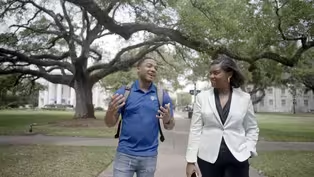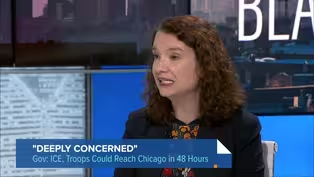Chicago Tonight: Black Voices
What to Know About Changes to Minimum Wage for Tipped Workers
Clip: 9/3/2025 | 9m 38sVideo has Closed Captions
The One Fair Wage ordinance took effect in Chicago last year.
While Mayor Brandon Johnson and advocates say raising minimum wage helps the city's lowest-paid workers, critics worry about the higher labor costs facing restaurants.
Problems playing video? | Closed Captioning Feedback
Problems playing video? | Closed Captioning Feedback
Chicago Tonight: Black Voices is a local public television program presented by WTTW
Chicago Tonight: Black Voices
What to Know About Changes to Minimum Wage for Tipped Workers
Clip: 9/3/2025 | 9m 38sVideo has Closed Captions
While Mayor Brandon Johnson and advocates say raising minimum wage helps the city's lowest-paid workers, critics worry about the higher labor costs facing restaurants.
Problems playing video? | Closed Captioning Feedback
How to Watch Chicago Tonight: Black Voices
Chicago Tonight: Black Voices is available to stream on pbs.org and the free PBS App, available on iPhone, Apple TV, Android TV, Android smartphones, Amazon Fire TV, Amazon Fire Tablet, Roku, Samsung Smart TV, and Vizio.
Providing Support for PBS.org
Learn Moreabout PBS online sponsorship>> Chicago's tipped workers may have noticed a little more in their paycheck this summer.
It's part of the one fair wage ordinance that took effect last year.
The ordinance phases out the tipped minimum wage in 5 years so that it matches the citywide minimum wage by July 2028. last year wages went up to $11.02 this year.
It increased again to $12 and $0.62 an hour.
Well, Mayor Johnson advocates say the move helps the city's lowest paid workers.
Critics worry about the higher labor costs facing restaurants.
Joining us to discuss the move are the talk erodes, the national organizer with one fair wage.
And Scott Wiener board chairman for the Illinois Restaurant Association.
Thanks to both for joining us.
We appreciate it.
Thank you for evidence being that hockey starting with you first.
This is the second year of the phase out of this minimum wage or the phase.
And I should say the minimum wage increase for tipped workers.
What do you think this is needed?
>> Because the impact of workers putting more money in pocket that helps the economy that has helped Chicago with the economy to boost the economy and to put more money into workers packet.
That means that workers can be able to put food on the table be able to do the things that they need to do.
>> What's been the response from workers so far have been earning tweet.
It's been over when Lee great like workers are great.
Glad that they're getting receiving a to wage increase.
>> And it's really not about getting tip.
It's really about the wage increase.
And so workers always happy and excited.
talked to thousands of the workers this past Labor Day.
This is Labor Day weekend and very happy that they feel wage increase in paychecks.
>> I'm Scott Wiener was in the impact on runs so far.
Well.
I'm seeing something different.
I we've been hosting town halls over the city and from what we've been hearing from workers and what from what thinks picks Prince in our own restaurant says that workers are actually losing hours.
>> Since last year, 5200 jobs have been lost alone in the Chicago service industry.
So while the intention is good, we want to get bigger paychecks to people.
The unintended consequences is that our servers are losing their jobs.
Our back of the House employees.
They're not getting wage increases and that restaurants are closing their doors currently over 100 restaurants close their doors from last year.
And we just started the next phase in.
The expectation is many more restaurants will close and well, everybody wants to see people make more money.
Unfortunately, the consumers on able currently to handle higher price increases.
So their dining out less, which is just exasperating this issue, a restaurant having to pass that additional costs on to their consumer customer ideally in a great economy, you could.
But right now what we're seeing, especially in the neighborhood 79th Street 53rd Street Clark weekend is that these neighborhoods spots, they just don't have anything left to pass on to the consumer.
That's already cash strapped.
So what ends up happening here is that restaurants are cutting hours.
They're cutting shifts and ultimately there's nothing left to pass on.
And there's a restaurant tour and just speaking in general for this industry right now, the margins are so tight as it is.
If you think about it, you know, one to 3% profit.
If you do a million dollars in sales, you might be taking 10 to 10,000 maybe 30,000.
The bottom line.
So that is if you're doing that.
So right now, unfortunately, we're seeing the opposite.
We're seeing restaurants just unable to do this, which means that we're turning to technology, QR codes for ordering and while some servers may be making more per hour, they're actually making less overall.
And that's what the Department of Labor shows Are they making less overall because it was hours within hours of the jobs yet.
So restaurants Chicago.
>> It was over 859 new restaurant that apply for their restaurant to open a license.
Every day.
Chicago has new restaurants open up.
>> They are making money.
the tour is in the concerts and everything.
>> Are making money in bring in money into Chicago, Chicago restaurants.
I'm not closing due to >> just that wage increase that just took place this year.
That's not why they're closing their closing due to mismanagement of their profits.
And on 79 in Keene Drive it just a phase restaurants than so full.
They have to raise their prices.
They already raising their not prices but their wages due to they can really get anyone to come and work for low wages.
And the restaurant industry has always been a part and a formative work myself.
I worked here all my life.
This polling place that work in Chicago around Chicago outside of Chicago.
And so it's a role to say that Chicago is business is gonna hurt when the restaurant association is over.
The taste Chicago of the James Beard Award.
over a lot of things in.
But most of the restaurants that he's talking about, the 55th the so I love them.
I'm making my okay.
So Scott, you 100 restaurants had had to close in the last year since this went into effect.
Are you hearing from member restaurants that this a result of the increased minimum wage for tipped workers?
>> Well, I let's first off, let's just a 50, 50, 50, 50 close the doors.
And pretty sure that I didn't miss manage that place over 17 years to 50 your restaurant for us my first restaurant when I was in cases from what I I would say, though, is when we start really looking at facts, right?
859 new licenses.
Business licenses, right?
We're talking about quick-service.
We're talking about concessions.
We're talking about a food license in a grocery store.
So we're not talking about full-service restaurants with servers.
Ultimately.
And in that sort of brings me back to one for which if you just go to the website right now on on their Web site, the first thing lead with is that 50% of restaurant workers are thinking about leaving.
They the restaurant 73% 7 to percentage.
They want to tips.
>> one in interest no way to leaving because the tip Mitt Romney or a it's on their website now for 2 if that were to be the case, we have no restaurant industry to go a step further of the facts.
The data set that one for wage presented to city council to the mayor.
23 27 of those facts were actually internal.
Studies cited that one for which did themselves actually call.
So I want to bring in some facts that we got from the Bureau of Labor Statistics serve as an Illinois make an average wage of $16.68 per hour.
And average annual salary of 34,700.
>> Scott, first of all, what do you make of those numbers and what do you say to those who are concerned that workers aren't making enough to support themselves?
Well, I mean, to that point, right, that that is higher than the minimum wage in Chicago and those numbers do not cite the fact that in Chicago most servers are making between $28 and $0.50 per hour.
And as it is.
The people that really need get the wage increases the most are in the back of the House.
In what restaurants provide when we start talking about are back at how some plays where the anchors of these communities, when we really start falling into.
>> Our Hispanic employees, the ones that are not English-speaking, those people don't have the opportunity to be a server where as has often where they have the opportunity earn more in the 16 62 per hour.
At the end of the day, that is more.
Then the with minimum wage.
But this home low $34,000 is living on the move in on property.
>> On property and calm in Seoul today talk how does that, how does how does that has this this wage model right of a sub-minimum wage?
Plus tips.
Way to model.
How does that impact?
>> Black and Latino workers in particular and so how does it impact?
Well, first of all, to have the wage increase.
>> That impact of having a wage increase means that families can take care.
They sales.
That means that families can go probably not go give gold to Italy France, but they can get the things that they need at what they need and what they would like to have maybe get extra shoes for children.
>> Take care a rain on me.
I am a victim.
I am myself with the victim of of evictions and I had to work 2, 3, jobs just say because, okay, always.
So we've got 30 seconds left.
that's where I come back to is ultimately.
>> This didn't work in others.
It didn't work in D C didn't work anywhere else.
A stain on the way.
So what's happened in Chicago?
Well, it just stayed here on the ways that we've got wrap it up.
But DC did make a similar wage attempt to phase out their tip credit an increase, a sub-minimum wage.
They ended up partially repealing part of because claim was that restaurants closed due to higher expenses there.
But viewers are going go to our Web site.
They want to more about that because
New Documentary Explores History, Legacy of HBCUs
Video has Closed Captions
Clip: 9/3/2025 | 7m 8s | HBCUs began more than 188 years ago and have undergone significant changes. (7m 8s)
Violence Interrupters Prepare for Federal Troops in Chicago
Video has Closed Captions
Clip: 9/3/2025 | 3m 54s | Gov. JB Pritzker said the White House has not been communicating with Illinois officials. (3m 54s)
Providing Support for PBS.org
Learn Moreabout PBS online sponsorship
- News and Public Affairs

Top journalists deliver compelling original analysis of the hour's headlines.

- News and Public Affairs

FRONTLINE is investigative journalism that questions, explains and changes our world.












Support for PBS provided by:
Chicago Tonight: Black Voices is a local public television program presented by WTTW

